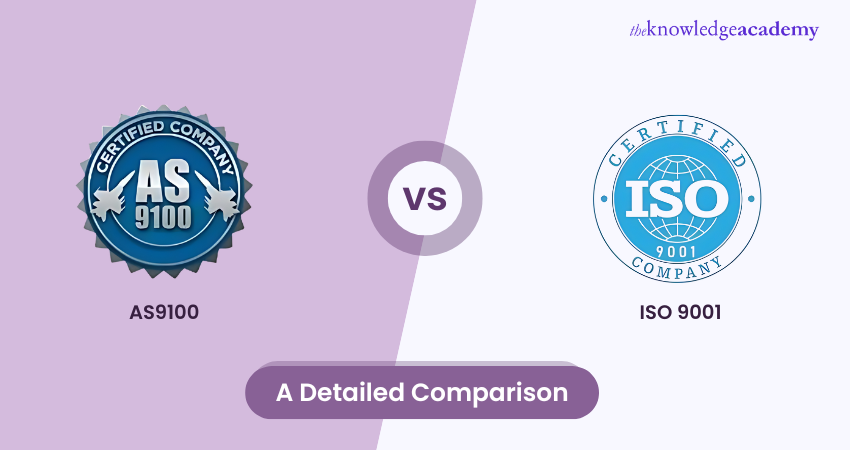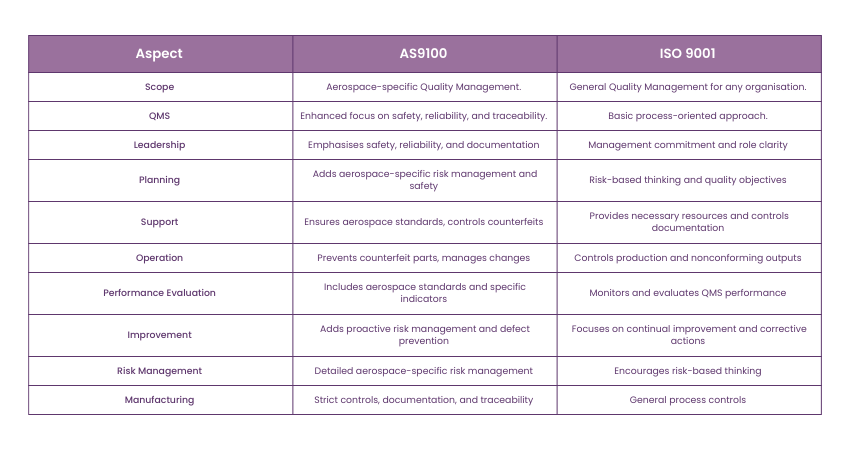We may not have the course you’re looking for. If you enquire or give us a call on +36 18508731 and speak to our training experts, we may still be able to help with your training requirements.
Training Outcomes Within Your Budget!
We ensure quality, budget-alignment, and timely delivery by our expert instructors.

Imagine standing at a crossroads, where one path leads to mere compliance with standards, while the other promises excellence. That’s the choice you face when considering between AS9100 vs ISO 9001. These two frameworks hold the keys to unlocking organisational success, but they differ significantly.
What if mastering the distinctions between AS9100 vs ISO 9001 could drive your organisation to new heights of success? Buckle up as we explore their nuances, dissect their scopes, and uncover the impact they can have on your business. Ready? Let’s embark on this enlightening journey!
Table of Contents
1) AS9100: An Overview
2) ISO 9001: An Overview
3) AS9100 vs ISO 9001: What’s the Difference?
a) Scope and Application
b) Quality Management System (QMS)
c) Leadership
d) Planning
e) Support
f) Operation
g) Performance Evaluation
h) Improvement
i) Risk Management
j) Manufacturing Details
4) Conclusion
AS9100: An Overview
AS9100 enhances the foundational ISO 9001 standards by integrating additional regulatory requirements and specialised notations specific to the aerospace industry. This standard is supported by the International Aerospace Quality Group (IAQG), an organisation composed of representatives from leading aerospace companies worldwide.
The AS9100 certification is widely recognised and often necessary for businesses operating within the aerospace sector. It ensures they meet the stringent quality and safety demands unique to this field.
ISO 9001: An Overview
ISO 9001 is a globally acknowledged standard for Quality Management Systems (QMS). It is designed to assist organisations of any size and sector in enhancing their overall performance. By adhering to ISO 9001 Requirements, organisations can better meet customer expectations and show a strong commitment to quality.
The standard provides a detailed framework for establishing, implementing, maintaining, and continuously improving a QMS. This ensures consistent quality in products and services.
Elevate your career with the ISO 9001 Lead Auditor Course - sign up now and master Quality Management!
AS9100 vs ISO 9001: What’s the Difference?
The following are the differences between AS9100 and ISO 9001:

Scope and Application
AS9100: Specifically designed for the aerospace industry, covering design, development, production, installation, and servicing with additional aerospace-specific requirements.
ISO 9001: Applicable to any organisation, regardless of size, type, or industry, focusing on general Quality Management principles. By following ISO 9001 Principles, organizations can ensure consistent quality and improve customer satisfaction.
Quality Management System (QMS)
AS9100: Enhances ISO 9001, emphasising safety, reliability, airworthiness, stringent risk management, and comprehensive documentation and traceability of components.
ISO 9001: Establishes a process-oriented approach for Quality Management, documenting processes, procedures, and responsibilities to achieve quality policies and objectives.
Leadership
AS9100: Enhances ISO 9001, emphasising safety, reliability, airworthiness, stringent risk management, and comprehensive documentation and traceability of components.
ISO 9001: Requires top management's ISO 9001 Leadership Requirements And Commitments to the QMS and continuous improvement, with clear assignment of roles, responsibilities, and authorities.
Planning
AS9100: Includes ISO 9001 planning with added focus on aerospace-specific risk management, product safety, and reliability throughout the product lifecycle.
ISO 9001: Integrates risk-based thinking into planning processes, setting quality objectives, and considering risks and opportunities that could impact the QMS.
Support
AS9100: Ensures resources and infrastructure meet aerospace standards, controls counterfeit parts, and ensures personnel are trained and qualified for product safety and reliability.
ISO 9001: Focuses on providing necessary resources, ensuring competency, awareness, and communication, and controlling documented information. Accurate ISO 9001 Documentation is essential for managing and maintaining quality standards.
Operation
AS9100: AS9100 enhances ISO 9001 with controls to prevent counterfeit parts, manage production changes, and meet aerospace-specific standards. It includes detailed requirements for configuration management, product traceability, and special process control to ensure product integrity and regulatory compliance.
ISO 9001: Emphasises planning, implementation, and control of production and service provision processes, including management of external providers and control of nonconforming outputs.
Performance Evaluation
AS9100: Includes all ISO 9001 performance evaluation requirements, with additional focus on meeting aerospace-specific standards and regulatory requirements. Emphasises measuring key aerospace performance indicators like on-time delivery, product conformity, and customer satisfaction.
ISO 9001: Involves monitoring, measurement, analysis, and evaluation of QMS performance, ISO 9001 Internal Audit, management reviews, and gathering customer feedback.
Improvement
AS9100: Emphasises aerospace-specific nonconformities and preventive measures to enhance safety and reliability. Focuses on proactive risk management and continual improvement of processes to prevent defects and ensure compliance with aerospace industry standards.
ISO 9001: Commits to continual improvement of the QMS through corrective actions and identifying opportunities for improvement.
Risk Management
AS9100: Expands on ISO 9001 risk management requirements by incorporating detailed risk management processes tailored to the aerospace industry. Requires the identification, assessment, and mitigation of risks throughout the entire product lifecycle, including design, development, production, and post-delivery activities.
ISO 9001: Encourages the use of risk-based thinking to find and solve hazards and possibilities within the QMS.
Manufacturing Details
AS9100: This requires strict process controls, detailed documentation, special process validation, and change management. It mandates comprehensive traceability, control of nonconforming products, and corrective actions and ensures high product safety, reliability, and regulatory compliance.
ISO 9001: Provides general guidelines for controlling manufacturing processes to ensure product conformity and quality.
Unlock quality success - join ISO 9001 Certification Training and transform your professional journey now!
Conclusion
In the comparison of "AS9100 vs ISO 9001," each standard brings unique strengths to the table. ISO 9001 provides versatile Quality Management for various industries, while AS9100 adapts these principles to the aerospace sector's specific needs. Both standards prioritise quality and continuous improvement, guiding organisations toward excellence in their respective fields.
Start your journey to excellence with the ISO 9001 Foundation Course – join now for Quality Management mastery!
Frequently Asked Questions

AS9100 certification is provided by accredited certification bodies authorised by the International Aerospace Quality Group (IAQG). These bodies carry out audits and assessments to ensure compliance with the AS9100 standards specific to the aerospace industry.

ISO 9001 is applicable to any organisation, regardless of size and sector. It aims to make sure customer satisfaction through effective Quality Management Systems, continuous improvement, and compliance with regulatory and customer requirements.

The Knowledge Academy takes global learning to new heights, offering over 30,000 online courses across 490+ locations in 220 countries. This expansive reach ensures accessibility and convenience for learners worldwide.
Alongside our diverse Online Course Catalogue, encompassing 17 major categories, we go the extra mile by providing a plethora of free educational Online Resources like News updates, Blogs, videos, webinars, and interview questions. Tailoring learning experiences further, professionals can maximise value with customisable Course Bundles of TKA.

The Knowledge Academy’s Knowledge Pass, a prepaid voucher, adds another layer of flexibility, allowing course bookings over a 12-month period. Join us on a journey where education knows no bounds.

The Knowledge Academy offers various ISO 9001 Certification, including ISO 9001 Foundation Course, ISO 9001 Lead Auditor Course, ISO 9001 Internal Auditor Training and ISO 9001 Lead Implementer Certification. These courses cater to different skill levels, providing comprehensive insights into ISO 9001 Internal Audit.
Our Business Improvement Blogs cover a range of topics related to ISO 9001, offering valuable resources, best practices, and industry insights. Whether you are a beginner or looking to advance your Business skills, The Knowledge Academy's diverse courses and informative blogs have got you covered.
Upcoming Business Improvement Resources Batches & Dates
Date
 ISO 9001 Foundation course
ISO 9001 Foundation course
Mon 6th Jan 2025
Mon 17th Feb 2025
Mon 3rd Mar 2025
Mon 7th Apr 2025
Mon 12th May 2025
Mon 2nd Jun 2025
Mon 7th Jul 2025
Mon 4th Aug 2025
Mon 1st Sep 2025
Mon 20th Oct 2025
Mon 10th Nov 2025
Mon 1st Dec 2025







 Top Rated Course
Top Rated Course



 If you wish to make any changes to your course, please
If you wish to make any changes to your course, please


